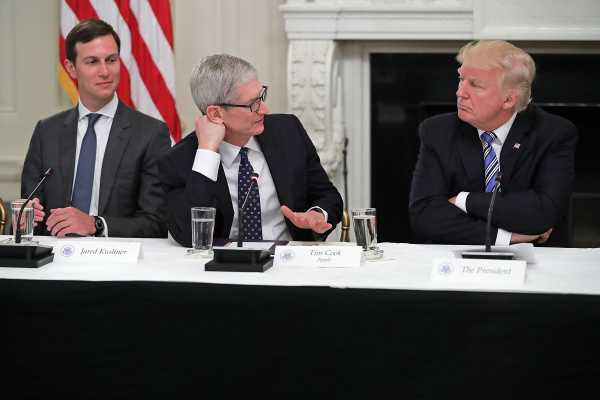
Apple just announced a stock buyback equal to the size of Ecuador’s GDP, thanks to the Republican tax cut bill.
In a quarterly earnings announcement on Tuesday, the Cupertino, California-based company said it would put in place a new $100 billion share buyback program and increase its quarterly dividend by 16 percent. It’s no coincidence that Apple is a major beneficiary of the GOP tax cuts — its effective tax rate (the amount it actually pays) has dropped by about 10 percent between this year and last, and it’s saving an estimated $47 billion on taxes on profits earned overseas as well.
Of the multiple major buyback announcements companies have made since the tax bill was passed in December, Apple’s is by far the biggest. But there have been others as well: The tech conglomerate Cisco in February said it would put an additional $25 billion toward a stock buyback. Troubled megabank Wells Fargo in January announced about $22 billion in buybacks. Pepsi announced a $15 billion buyback, Amgen and AbbVie $10 billion, and Google’s parent company Alphabet $8.6 billion.
Stock buybacks occur when companies repurchase shares of their own stock. That leaves remaining shareholders with a bigger chunk of the company and increases the earnings they reap per share. Buybacks have become increasingly popular in recent years and have boomed in the wake of the tax bill.
By June, Apple will have delivered $210 billion in buybacks to its shareholders since 2012, and it is now earmarking an additional $100 billion. It’s also upping its dividend to 73 cents per share from 63 cents.
Apple is returning more cash to shareholders than any company ever, the Financial Times’s Robin Wigglesworth wrote on Tuesday. By the summer, it will have given back more than the market value of all but 20 of the biggest publicly traded companies in the United States — bigger than Verizon, Mastercard, Coca-Cola, and Disney.
Apple is a huge winner in the Republican tax bill
The $1.5 trillion GOP tax cut slashed the corporate tax rate to 25 percent from 35 percent, reduced the rate on corporate income brought back to the United States from abroad to between 8 and 15.5 percent instead of 35 percent, and exempted American companies’ foreign income from US tax. It fosters a pretty rosy situation for Apple.
Even before the tax bill was passed, Apple wasn’t paying the full 35 percent corporate tax rate — during the first three months of 2017, it estimated it was paying an effective tax rate of about 26 percent. During that same time period this year, its estimated effective tax rate was 15 percent, a significant drop.
Apple is also reaping billions of dollars in savings on its overseas profits. It had about $252 billion in offshore cash reserves as of the end of September, the largest of any US company. Now that foreign profits will be taxed at a reduced rate, Apple will pay $38 billion of that in taxes to bring that money back. Of course, had it brought the money back years ago under the old tax regime, it would have owed billions more. In fact, for years, Apple refused to bring back its foreign cash until the US changed the tax code to what it deemed a “fair” rate.
The Financial Times estimated last year that the GOP tax bill would slash Apple’s tax liability by $47 billion. “They’re going to have well over $200 billion by the end of this year that will be available for incremental investments, capital returns, and M&A,” Bloomberg Intelligence analyst Matthew Kanterman told Bloomberg in January.
In a call discussing Apple’s earnings results on Tuesday, CEO Tim Cook directly attributed the buyback and dividend hike to the tax cuts. “Tax reform makes it possible for us to execute our program more efficiently, both through share repurchases and payment of dividend to the tens of millions of investors who own Apple stock either directly or indirectly from large pension funds to individuals with retirement accounts,” he said.
Cook has been sure to deliver a big public thank-you to Trump and the GOP
Cook and Trump have not always seen eye to eye. Then-candidate Trump called for a boycott of Apple products in 2016 after the tech giant refused to help the FBI break into the iPhone of one of the suspects in the San Bernardino, California, mass shooting. Cook has criticized the president’s stance on immigration and his decision to pull out of the Paris climate agreement. Last week, Cook met with Trump at the White House to discuss a number of issues, including concerns about China and trade.
Cook seems to have engaged Trump in a strange dance where they’re foes at one point and friends the next.
Soon after the tax bill was passed, Apple in January announced that it would make a $350 billion “contribution” to the US economy over the next five years. It also said it would put $5 billion into an “advanced manufacturing fund” and create 20,000 jobs. But what exactly all of that means — specifically, the vague “contribution” part — is unclear. Per The Verge:
Apple is certainly an important contributor to the US economy, and the tax cuts are likely to boost its business. But the announcement reads like so many of the corporate bonus and jobs celebrations that came after the tax cut: a giant public thank-you card to President Trump and the rest of the GOP.
Apple wasn’t exactly starved for cash prior to the tax cut either. As Vox’s Matt Yglesias pointed out last year, Apple has largely been able to borrow at very low rates to keep investing in the US. “Apple’s cash management game is to bide its time until it gets a tax windfall … and then kick the windfall out to shareholders in the form of dividends or buybacks,” he wrote.
And that’s what it did.
Sourse: vox.com






